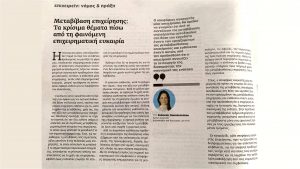Transfer of business: The critical issues behind the apparent business opportunity
The economic crisis that continues (despite the claims of the opposite) to plague our country, highlights business opportunities. Acquisition of businesses at low prices, due to the accumulated economic problems, is one of them. However, the acquisition of a business other than a business opportunity can at the same time constitute a serious risk to the interests of the acquirer.
This risk arises from the provision of Article 479 of the Civil Code. Under this provision, the acquirer of the undertaking is responsible also for the undertaking’s debts at the time of the transfer, up to the value of the transferred assets. Particular attention should be paid to the fact that the same liability lies for the acquirer in the event of the transfer of an individual asset of the undertaking when this asset is the sole or the most valuable (significant) asset of the undertaking. Thus, for example, the transfer of a significant value property or the clientele of an undertaking, which is it’s sole or the most important asset, entails the liability of the acquirer for the debts of the undertaking, provided that the acquirer knows that acquires the sole or the most important asset of the undertaking.
What is crucial is that for this liability to incur, the acquirer is not required to be aware of the existence of the debts at the time of the transfer.
The acquirer is, by the letter of the law, liable “up to the value of the transferred assets”. Under what seems to be prevailing view, for these debts, there are liable towards the creditors of the undertaking not only the assets transferred but also the other assets of the acquirer. The position of the acquirer becomes (financially) more difficult when he has paid in exchange for the acquisition of the undertaking: his liability is born regardless of whether the transfer was made under an acquisition or due to a gratuitous cause.
From the above, what becomes evident is the necessity of the conduct of “due diligence” before acquiring an undertaking/ a business. The pre-contractual, i.e., auditing process from a legal, financial, etc., view of the business to be sold. In particular, with the assistance of its legal and financial adviser, the interested acquirer is informed on the liquidity, debts, assets and legal relationships of the undertaking to be sold. This audit significantly restricts – if not completely – the risk of finding the buyer obliged to pay debts of the transferred business, which he was unaware of.
Finally, a potential acquirer of a business should be aware that, as a result of the transfer, it automatically enters the employer’s position vis-à-vis the employees of the transferred business and is liable to them, provided that the undertaking continues to operate by maintaining its economic unity. In case a part of a business is transferred, the buyer automatically substitutes the transferor only for the employment relationship with the employees of that specific part.
In conclusion, each potential acquirer of business, before starting negotiations for its acquisition, is required, in order to avoid problems, to keep in mind all the above factors and to receive appropriate guidance from its legal and financial advisors.
Evdokia Kornilaki
Senior Associate
Υ.Γ. This article has been published in MAKEDONIA Newspaper, on the 23rd of March 2019.


